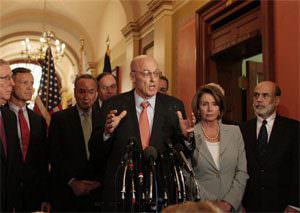The Decriminalization of Corporate Crime
With our economic and financial crises deepening, government insiders reportedly are debating whether we need to restore some regulation -- or not. Given the state of things, we can expect further woes and no regulation.
With our economic and financial crises deepening, government insiders reportedly are debating whether we need to restore some regulation — or not. Given the state of things, we can expect further woes and no regulation.
Why have regulation when JPMorgan can gobble up Bear Stearns for peanuts, with the backstage encouragement and acquiescence of the Federal Reserve Board? The Fed’s concern for the big investors is no surprise, and it needed no cue from John McCain to reject any thoughts of helping the victims of the banks’ sting operations. Meanwhile, JPMorgan has offered bonuses to Bears Stearns’ top brokers to stay on, though many of them are probably responsible for the subprime loans Bear Stearns so aggressively pursued.
George W. Bush and his cohorts have quietly dismantled more than a century of regulatory history — and good history at that. If we truly are to have “change” in Washington, the “changers” must begin by restoring those proven, efficient and protective elements of the regulatory state.
Last week also brought news of a “passport scandal,” and it reflects the other side of the Bush administration’s coin of the realm. Accounts of the incidents consistently say that the perps involved were “contractors.”
Not until later did we learn the names of several District of Columbia-area State Department private contractors in the case, and the information reflects the exponential explosiveness of private contract work in the public sector.
Perhaps the unauthorized scrounging around in the passport files is merely an instance of mischievous political elves and fairies anxiously seeking to expose controversy. Imagine an Ann Coulter acolyte: “Let’s riffle through Obama’s files.” Or a Rush Limbaugh Dittohead: “Let’s find the dirt on Hillary, and don’t forget McCain.” That is the benign view. Just as likely, they were planted political apparatchiks — who probably never heard the word — deliberately deputized to seek out political “intelligence.” Here we have private “contractors” working for the State Department in a sensitive area. Why not? The Bush administration has substituted a vigorous program of “privatization” to both replace and expand government programs. Top-secret security clearances are routinely granted to private companies that now do “analyses,” “reviews” and “critical studies” for the Pentagon or the CIA.
We are now familiar with DynCorp International and Blackwater USA and their operations as a private, free-booting, unaccountable arm of government. We talk of a “surge” to provide security within Iraq, but it is clear that the security will be maintained by Blackwater and others to shore up an undermanned, overworked American military. The last eight years have profoundly altered the nature of government operations. Coincidentally, with the passport news we learn that the State Department’s use of private contractors has grown on an immense scale.
Much of that has been for Iraq operations for which the State Department maintains oversight functions, though not too well as it turns out. The State Department has created the Office of the Procurement Executive. Its Web site, written in advanced bureaucratese, portrays itself as the facilitator, not the auditor, for all dealings with private contractors — without mentioning them, however. Its self-proclaimed mission is “to ensure the timely delivery of quality goods and services that directly results in creating a more secure, democratic, and prosperous world for the benefit of the American people and the international community.” Enter the keepers of passport files in this Brave New World.
Privatization is a prevailing creed for this administration. It readily takes credit for “limiting” the growth of government by freezing or depleting the mandated bureaucracy, but at the same time it provides boundless largess to the private sector. Meanwhile, less than sensational stories expose the myth that privatization is a cost-saving venture. A new report of Pentagon auditors found excessive reliance on outside contractors, who often cost more. Last year, the Defense Department spent $158.3 billion on services, a 76 percent increase over the past decade. Buried in that report was the observation that private contractors assume unintended responsibilities.
The dismantling of government programs and regulation with the concurrent growth in privatization goes beyond the present regime. The Bush administration merely has implemented a radical extension of a process long under way. For 30 years, so-called centrist Democrats, anxious to shed any scarlet mark of liberalism, have eagerly sought consensus and accommodation with conservatives, largely by adopting their creed of small, cheap government — government that would fuel the private sector. Thus the seduction of “deregulation” and the accompanying creed of “privatization.” How and why they abandoned a faith that had served them and the nation so well and for so long is a mystery.
The irony is that the failures and crimes of Richard Nixon so discredited, so debilitated the ideology of their opponents. Anyway, the result has been the prominence of the Democratic Leadership Council, the crippling compromises of the Clinton administration, and the spectacle of Good Old Joe Lieberman accompanying John McCain on his foreign tour — as what, vice president in waiting? Secretary of state-designate? Sancho Panza?
We always have recognized the place of the “Fourth Branch” of government — meaning the plethora of alphabet-soup agencies with an admixture of executive, legislative and judicial functions, which exist largely to regulate the economy. Now, it appears, 20th century political science is mostly consigned to the dustbin of history. As always, “reform” and “change” have had their unexpected consequences.
The unwarranted search of private passport files raises important issues for the future of government and our familiar constitutional order. Juvenal’s timeless conundrum will not go away: Quis custodet ipsos custodes? — Who will guard these self-same guardians? What is the future of all this privatization? Will we insist on the accountability — the checking and the balancing — which has been the hallmark of our constitutional system? Or will we continue the administration’s weapon of choice: a blanket policy of legal immunization, such as is enjoyed by Blackwater?
Stanley Kutler is the author of “The Queendom of Passports,” in his “The American Inquisition: Cold War Political Trials.”
Your support matters…Independent journalism is under threat and overshadowed by heavily funded mainstream media.
You can help level the playing field. Become a member.
Your tax-deductible contribution keeps us digging beneath the headlines to give you thought-provoking, investigative reporting and analysis that unearths what's really happening- without compromise.
Give today to support our courageous, independent journalists.





You need to be a supporter to comment.
There are currently no responses to this article.
Be the first to respond.